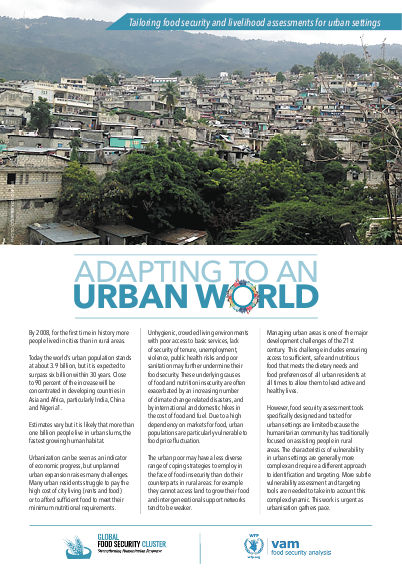
By 2008, for the first time in history more people lived in cities than in rural areas. Today the world’s urban population stands at about 3.9 billion, but it is expected to surpass six billion within 30 years. Close to 90 percent of the increase will be concentrated in developing countries in Asia and Africa, particularly India, China and Nigeria . Estimates vary but it is likely that more than one billion people live in urban slums, the fastest growing human habitat. Urbanization can be seen as an indicator of economic progress, but unplanned urban expansion raises many challenges. Many urban residents struggle to pay the high cost of city living (rents and food) or to afford sufficient food to meet their minimum nutritional requirements.
Unhygienic, crowded living environments with poor access to basic services, lack of security of tenure, unemployment, violence, public health risks and poor sanitation may further undermine their food security. These underlying causes of food and nutrition insecurity are often exacerbated by an increasing number of climate change related disasters, and by international and domestic hikes in the cost of food and fuel. Due to a high dependency on markets for food, urban populations are particularly vulnerable to food price fluctuation.
The urban poor may have a less diverse range of coping strategies to employ in the face of food insecurity than do their counterparts in rural areas: for example they cannot access land to grow their food and inter-generational support networks tend to be weaker.
Managing urban areas is one of the major development challenges of the 21st century. This challenge includes ensuring access to sufficient, safe and nutritious food that meets the dietary needs and food preferences of all urban residents at all times to allow them to lead active and healthy lives. This document is a summary of the Adapating to an Urban World Project.
Links
Resource collections
- UN Habitat - Urban Response Collection
- Urban Response - Urban Crisis Preparedness and Risk Reduction
- Urban Response Collection - Community Engagement and Social Cohesion
- Urban Response Collection - Economic Recovery
- Urban Response Collection - Environment and Climate Change
- Urban Response Collection - Housing, Land and Property
- Urban Response Collection - Urban Crisis Response, Recovery and Reconstruction
- Urban Response Collection - Urban Resilience